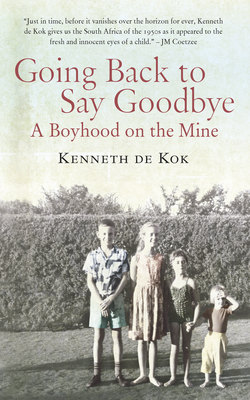Читать книгу Going Back to Say Goodbye - Kenneth de Kok - Страница 9
На сайте Литреса книга снята с продажи.
How We Got Here
ОглавлениеOur family crest hangs right at the front door next to Grandad Smith’s painting of two waterbuck. There are silvery wings on top of a helmet and underneath a shield that’s got green water lilies and iron stakes painted on it. My dad got it from his dad who got it from his dad. All the way back to 1200-and-something.
A chieftain called Le Cocq swam across the moat and climbed the walls of Ruynsberg Castle in Holland to rescue Countess Ada. For his bravery, Count Dirk, Ada’s brother, gave the chieftain his own coat of arms.
Le Cocq changed to de Kok long ago.
“Hey you, de Kok!” kids say. “You’ve got a big hairyback name. How come you’re not at the rockspider school?” I’d explain, but they’re stupid and walk away laughing like crazy.
I’d say, “My mother’s maiden name is Smith. English, right?” Then I’d say the names of all the kids in our class with Afrikaans surnames: De Waal, Liebenberg, Abrahamse, Lourens. They all speak English at home, and that’s why they’re here at Strathvaal, at an English-medium school, and not at Stilfontein Laerskool.
In South Africa, first you’re either black or white. And if you’re white, you’re either English or Afrikaans. There are others, like Greeks, Portuguese, Jews and Lebanese, but they count as English.
In 1854 my great-grandfather Pieter came to South Africa from Holland and settled in the Orange Free State. His second-oldest son, my grandfather, was born in 1869 and died in Johannesburg in 1947, a year before my mom and dad were married. His name was Henri, the same as my second name.
He went bankrupt after the Boer War; first he lost the farm and then his hotel in Winburg. That part of the family wouldn’t speak Afrikaans at all, but walked around Winburg in wooden clogs, talking Dutch: Hooghollands they called it. They blamed the Afrikaners for everything and moved to Johannesburg. From then on, the family only spoke English; Grandad stayed home and let my gran earn the money. He polished the children’s shoes, dried peaches in the back yard and drank brandy.
Granny de Kok’s maiden name is Van Niekerk, but her friends call her “Tolly” because her second name is Taillefere. Some of her ancestors were French Huguenots and she says that somewhere in France there’s a buried treasure that belongs to us.
She was seventeen when she got stuck in the siege of Kimberley and had to eat horsemeat. After that she taught primary school in Winburg and married my grandfather when his first wife died of diphtheria. She must have been Afrikaans but now speaks English with a posh accent. She has a prickly white moustache and sits by the radio listening to love stories and the prices on the Johannesburg Stock Exchange.
Mom’s side is the Smith side. Her grandfather Bill was a cockney who came out to South Africa in 1890. He was nineteen and worked as a propman in a theatre in Durban when he first arrived. That’s where he met Maggie Stewart, our great-grandmother. Her family grew sugar cane but she was a “Gaiety Girl” in the same theatre. Someone who also liked her cut off Bill’s thumb in a fencing match. But she still chose Bill and had twelve children in fifteen years.
In 1896 he took part in the Jameson Raid. My dad says Cecil Rhodes planned it all and that the whole gang were a bunch of bloody jingoes and were lucky they weren’t hanged.
Mom says Great-grandad Bill was a small bully. That family loved singing and on Friday nights the sons would drink and box in the kitchen.
Grandad Smith loved my mom, the Queen and everything English. He drove a Morris and wouldn’t buy anything made in Germany. He was a blacksmith first, but studied to be a health inspector. He really wanted to go to London once in his life, but didn’t make it.
Gran Smith’s maiden name is Rowles. Her father came from England with the troops to fight in the Boer War. He was in the veterinary corps and afterwards stayed on in South Africa and became a builder. His wife was a Dreyer, an Afrikaner. One of her relatives was the girlfriend of Robey Leibbrandt, the Nazi traitor. My dad says they should have hanged him from the tallest building in the Union.
When Great-grandad Rowles died in 1934, he had a military funeral and Mom says soldiers fired shots over his grave.
Granny Smith lives with us now at 156 Van Riebeeck. She came when Grandad died. She’s got diabetes and angina but can’t stop eating cakes and sweets. She loves chatting and playing cards – bridge, canasta, rummy, even Monopoly – so long as she’s having fun. She hides chocolates in a biscuit barrel in her cupboard and an assortment box of sweets in her chest of drawers and bribes me to scratch her back.
Here in Stilfontein most of the managers and engineers are English, but my dad says that’s slowly changing. The Afrikaners are starting their own mining companies and banks. They don’t just want to be farmers or train conductors any more.
So of my eight great-grandparents, two are Dutch, three are English and three are Afrikaans. Everything’s mixed up. That’s how it works here. Some people end up speaking English and others Afrikaans.
Because of the Boer War and other stuff, English and Afrikaners don’t like each other much. My dad’s side of the family is not sure which side to be on. They think that lots of Afrikaners are “proper gawies” and only run the country because there are more of them. But they have a problem with English-speakers too, who think that England is their proper home and don’t really understand or love South Africa.
